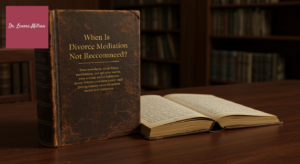Marriage counseling can be transformative for couples looking to strengthen their bond, resolve conflicts, or enhance their communication. Whether you’re struggling with specific issues or simply seeking to improve your relationship, the decision to seek marriage counseling is often a sign of commitment and a desire to work together for a better future. For many couples, the first session can be filled with uncertainty. You might wonder, “What happens in marriage counseling?” or “What should we expect in our first session?” Understanding what to anticipate can help ease any anxiety and set a positive tone for the counseling process.
Initial Assessment and Relationship History
In your first marriage counseling session, the counselor will typically begin by gathering information about your relationship history. This helps them understand the dynamics of your relationship and any issues that have led you to seek help. The therapist may ask questions like, “How did you meet?” “What are the strengths in your relationship?” or “What issues have led you to seek marriage counseling?” This is an important part of what happens in marriage counseling, as it sets the stage for understanding the root causes of the challenges you are facing.
This part of the session is a way for the counselor to assess both partners’ perspectives and start to identify any patterns or dynamics that could be contributing to the challenges in the relationship. The therapist will likely encourage each partner to express their thoughts and feelings openly and respectfully, ensuring that both sides are heard. This process helps establish a foundation of trust, which is crucial for the success of couples therapy.
Setting Goals and Expectations for Therapy
Once the counselor has a better understanding of the relationship, they will likely discuss your goals for counseling. Couples often come to therapy with specific issues in mind, such as communication problems, trust issues, or conflict resolution difficulties. However, some couples may simply want to improve their overall relationship without any one specific problem standing out.
The counselor will work with you to define clear, realistic goals for the therapy process. This could include improving communication skills, learning how to resolve conflicts without escalation, or rebuilding emotional intimacy. The therapist will also discuss what to expect during the counseling process, the frequency of sessions, and any techniques or strategies that may be used in future meetings. Having clear goals and expectations can help ensure that both partners are on the same page and committed to the process.
The Role of the Marriage Counselor
Understanding the role of the marriage counselor is an important part of what happens in couples therapy. The therapist is there to facilitate productive conversations between both partners, offering guidance, support, and strategies for improving the relationship. They act as a neutral party, creating a safe and open space for both individuals to express their concerns and work toward resolutions.
It’s important to note that the therapist is not there to take sides or make decisions for you. Rather, they provide tools and techniques to help both partners communicate more effectively and work through challenges. The counselor will guide discussions, ask probing questions, and offer suggestions that can help both partners gain insight into their behavior and emotions.
Common First Session Questions
In the first marriage counseling session, the counselor will likely ask a variety of questions to understand your relationship better. These questions can include:
- “How would you describe your relationship?”
- “What brought you to therapy today?”
- “What do you hope to achieve in counseling?”
- “How do you typically resolve conflicts in your relationship?”
- “What are some positive aspects of your relationship?”
These questions are designed to help the counselor understand where you and your partner are in the relationship and what areas need the most attention. They also give both partners the opportunity to express their feelings and concerns in a structured environment. Responding to these questions thoughtfully and honestly can provide the counselor with the necessary information to tailor the counseling process to your specific needs.
Building a Safe and Non-Judgmental Space
One of the primary goals of marriage counseling is to create a safe, non-judgmental environment where both partners feel comfortable expressing themselves. The therapist will foster an atmosphere of respect and empathy, ensuring that both partners feel heard and understood. This is especially important in the first session, as it sets the tone for the rest of the therapy process.
The counselor will encourage both partners to communicate openly and honestly, but also with respect for one another. This is an opportunity for both individuals to share their perspectives and feelings, and for the therapist to provide guidance on how to communicate more effectively going forward. Building trust in this first session is crucial for making progress in couples counseling, as it allows both partners to be vulnerable and open to change.
The Therapist’s Approach and Techniques
Different marriage counselors have different approaches and techniques, depending on their training and the needs of the couple. Some therapists may use specific methods like Cognitive Behavioral Therapy (CBT) or Emotionally Focused Therapy (EFT) to help couples better understand their emotions and behaviors. Others may focus on communication skills, conflict resolution, or rebuilding trust.
In the first session, the counselor may introduce some of these techniques, or they may take a more observational approach, spending time listening and learning about the couple’s dynamics. This initial meeting is often a time for the therapist to get a sense of what techniques and approaches will be most effective based on the couple’s unique needs.
What Happens After the First Session?
After your first marriage counseling session, the therapist will likely schedule follow-up sessions to continue the work. During these sessions, the counselor will build upon the initial discussions and begin to implement specific strategies to address the issues raised in the first meeting. The process of couples counseling can take time, so it’s important to be patient and stay committed to the process.
The therapist may assign homework between sessions, such as practicing communication exercises, writing down thoughts and feelings, or trying new ways of resolving conflicts. These assignments are designed to reinforce the concepts discussed in therapy and help couples implement changes in their everyday interactions.
Conclusion
Starting marriage counseling can feel daunting, but understanding what to expect in the first session can help alleviate any anxiety. In the first meeting, you’ll share the history of your relationship, discuss therapy goals, and begin improving communication and resolving conflicts. Whether you are facing specific issues or simply looking to strengthen your relationship, marriage counseling provides a safe space for both partners to work through their challenges. For couples in Fairfield County, CT, marriage counseling offers a structured and supportive environment to address relationship dynamics. By committing to the process, couples can make meaningful changes, foster deeper connections, and build a stronger, healthier partnership. The expert guidance provided through professional counseling ensures couples can navigate complex emotions and restore harmony, creating a solid foundation for the future.



